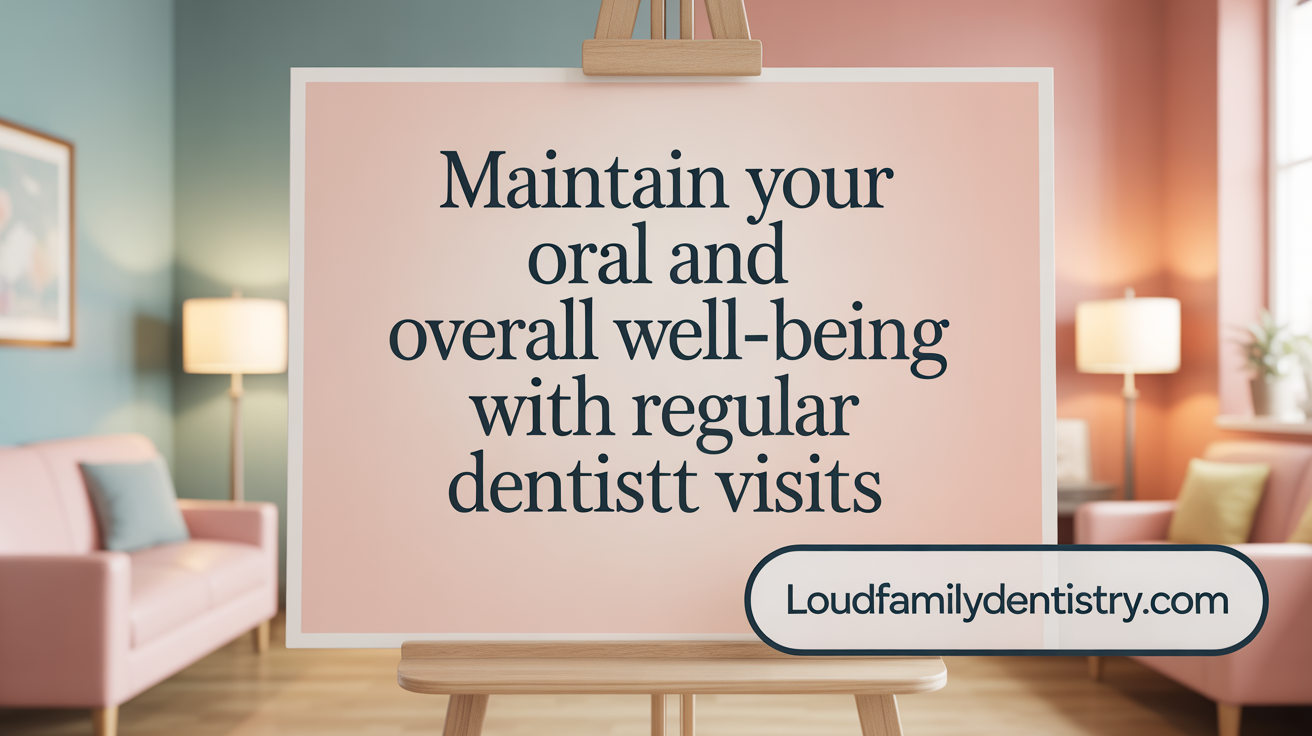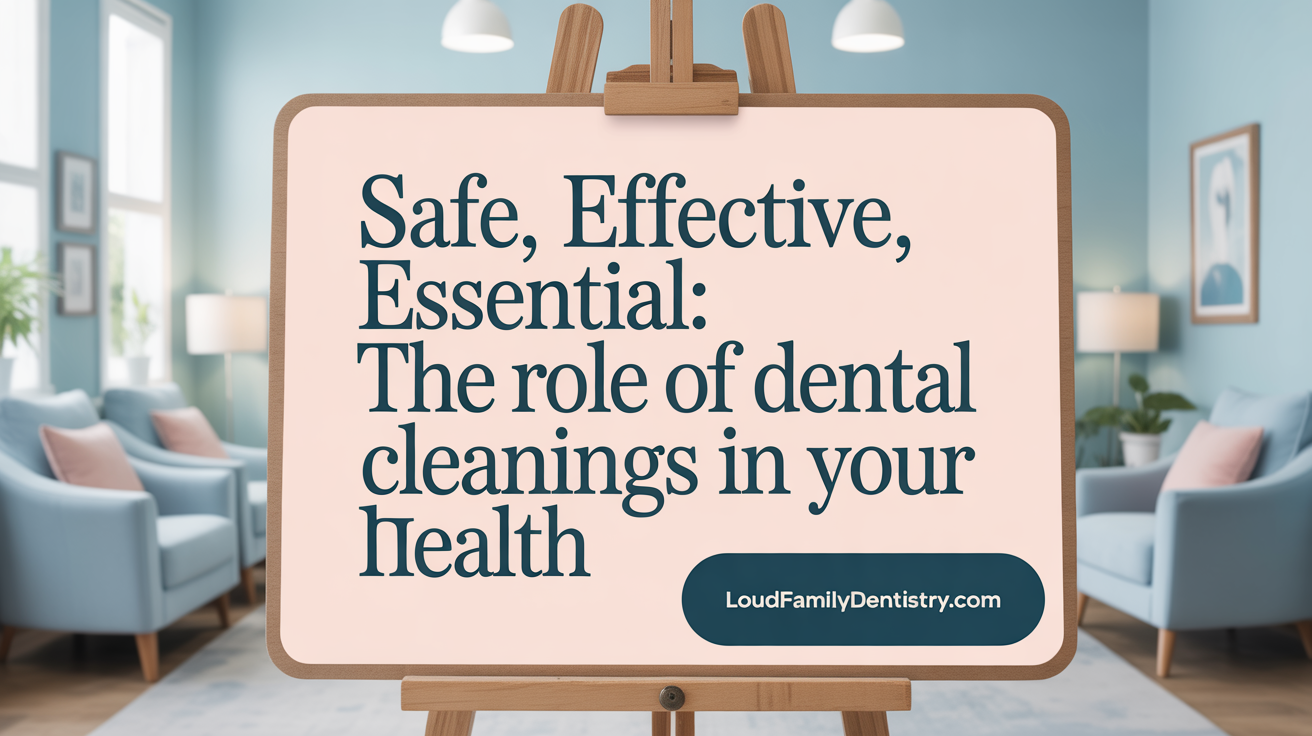Understanding the Value of Routine Dental Care
Regular dental checkups and cleanings are more than just about maintaining a bright smile—they are essential components of overall health and well-being. Through consistent dental visits, individuals can prevent serious oral health issues, detect problems early, and receive personalized care that supports a lifetime of healthy teeth and gums.
The Essential Role of Regular Dental Checkups

Why is it important to have regular dental visits?
Regular dental visits are crucial for maintaining good oral health and preventing serious dental issues such as cavities, gum disease, and oral cancer. During these visits, dentists can spot early signs of problems that might not be noticeable to patients at home. This early detection allows for timely treatment, preventing small issues from developing into more complex and costly procedures later. Additionally, professional cleanings help remove plaque and tartar buildup that regular brushing and flossing can't fully eliminate. Routine checkups also provide personalized advice tailored to individual dental needs, supporting long-term oral health. Moreover, good oral health is closely linked to overall health, reducing the risk of systemic diseases like heart disease and diabetes.
What can patients expect during a dental checkup and cleaning?
During a typical dental checkup and cleaning, patients undergo a thorough examination of their teeth and gums. The dentist or hygienist will inspect for cavities, signs of gum disease, and other issues, while also checking for early indicators of oral cancer.
The cleaning process involves removing plaque and tartar through scaling, followed by polishing the teeth to remove surface stains and make them smooth. X-rays may be taken for deeper assessments if necessary, helping to detect problems hidden beneath the surface, such as impacted teeth or bone decay.
The visit usually includes flossing, oral hygiene advice, and sometimes preventive measures like fluoride treatments or sealants. These steps help keep the teeth healthy, prevent future problems, and support overall wellness. Regular checkups are a key part of maintaining a bright, healthy smile and catching potential issues early, saving patients from discomfort and costly treatments later.
Benefits and Safety of Professional Dental Cleanings
 Regular dental cleanings are an essential part of maintaining good oral health. They help remove plaque, tartar, and biofilm that ordinary brushing and flossing often cannot eliminate. This thorough cleaning process prevents the development of common problems such as cavities, gingivitis, and bad breath. Moreover, professional cleanings contribute to overall health; studies link good oral hygiene with reduced risks of serious conditions like heart disease, stroke, and dementia.
Regular dental cleanings are an essential part of maintaining good oral health. They help remove plaque, tartar, and biofilm that ordinary brushing and flossing often cannot eliminate. This thorough cleaning process prevents the development of common problems such as cavities, gingivitis, and bad breath. Moreover, professional cleanings contribute to overall health; studies link good oral hygiene with reduced risks of serious conditions like heart disease, stroke, and dementia.
One significant advantage is the early detection of potential issues. During cleanings, dentists can identify signs of tooth decay, gum inflammation, or even oral cancers, enabling prompt treatment before problems escalate. This proactive approach can save patients time and money, avoiding more invasive procedures in the future.
Sometimes, people worry about discomfort during dental cleanings. It’s possible to experience some pain, especially if gums are inflamed or sensitive. Factors like tartar buildup, gum recession, or exposed nerves may cause discomfort during the procedure. Communication with your dental provider is vital; using numbing gels or specialized techniques can help reduce pain and enhance comfort. Overall, while some mild discomfort is common, it’s usually manageable.
There are different types of dental cleanings suited to varying needs. Routine cleanings, known as prophylaxis, focus on general plaque and tartar removal. Deeper cleanings, such as scaling and root planing, are used for advanced gum disease. Some patients may also receive preventive treatments like fluoride applications or sealants during visits.
In summary, professional dental cleanings not only improve oral appearance and freshness but also play a vital role in preventing serious health issues. When performed by qualified professionals, they are safe and effective, with minimal risks. Regular visits—typically twice a year—help ensure a healthy mouth and contribute positively to overall well-being.
Preventive Dental Care’s Impact on Overall Health and Well-being
How does preventive dental care contribute to overall health and well-being?
Preventive dental care is a fundamental component of maintaining good health. Regular visits to the dentist enable early detection of dental issues like cavities, gum disease, and even oral cancer. When these problems are caught early, they can be treated more effectively, often preventing more serious health complications.
Research shows a strong link between oral health and systemic health. For example, gum disease and inflammation have been associated with heart disease, stroke, and diabetes. Poor oral hygiene can allow bacteria to enter the bloodstream, contributing to infections that affect other parts of the body.
Furthermore, good dental care supports nutrition by maintaining healthy teeth and gums, which are essential for proper chewing and digestion. It also promotes better oxygen intake and reduces bacteria in the mouth that could cause respiratory infections.
Access to preventive services and education helps reduce disparities in health, especially among vulnerable populations. By emphasizing regular dental checkups, cleanings, and hygiene education, preventive care boosts overall health and elevates quality of life.
In summary, investing in routine dental care not only preserves oral health but also plays a vital role in preventing systemic diseases, supporting nutrition, reducing healthcare costs, and improving overall well-being.
Frequency and Guidelines for Routine Dental Visits and Cleanings
How often should people get their teeth professionally cleaned?
The typical recommendation for professional teeth cleaning is to have this done every six months, or twice a year. This schedule helps maintain good oral health by removing plaque and tartar that regular brushing and flossing might miss. Regular cleanings can prevent cavities, gum disease, and help catch early signs of problems that might not be noticeable at home.
However, individual needs can vary based on health and habits. People with higher risk factors—such as smokers, diabetics, or those with a history of gum disease—may require more frequent visits, sometimes every three to four months. Conversely, those with good oral hygiene and no existing issues might only need annual checkups, though twice a year remains the standard.
Ultimately, the best interval for cleanings should be personalized. Dentists assess each person’s oral health status and risk factors to recommend an appropriate schedule that helps preserve long-term oral health.
What are some compelling reasons to visit a dentist regularly?
Regular dental visits play a vital role in early detection and prevention of numerous oral health issues, including cavities, gum disease, and oral cancer. Early diagnosis can prevent these problems from worsening, reducing the need for complex and expensive treatments later.
Dentists provide professional cleanings to remove stubborn plaque and tartar buildup, which are difficult to eliminate at home. They also offer personalized advice on maintaining effective oral hygiene routines, which contribute to overall health.
Furthermore, routine check-ups can reveal signs of systemic health conditions such as diabetes and heart disease through oral examinations. This connection underlines the importance of dental visits for overall health.
In addition to preventing disease, regular dental care improves aesthetics through whitening and cosmetic discussions, boosting confidence. It supports long-term outcomes like preserving natural teeth and reducing the risk of tooth loss, significantly enhancing quality of life and overall wellbeing.
Dentists’ Role in Promoting Oral and General Health
What is the role of dentists in society and in maintaining oral health?
Dentists are vital in safeguarding and promoting overall health through maintaining good oral hygiene. They provide essential preventive and restorative care, helping to prevent issues like cavities, gum disease, and oral cancer. Regular dental visits enable early detection of dental problems, which can otherwise lead to painful, costly treatments and even systemic health issues like heart disease or diabetes.
Beyond individual patient care, dentists also contribute to public health initiatives. They advocate for increased access to dental services, especially for underserved communities, and work to reduce health disparities. Their efforts include promoting oral health education and preventive measures like fluoride treatments and sealants.
Furthermore, dentists act as early detectors of systemic diseases. Many health conditions, such as oral cancer or signs of nutritional deficiencies, manifest initially in the mouth. Routine examinations can reveal clues that prompt further medical assessment, strengthening the connection between oral and overall health.
Overall, dentists are indispensable to societal well-being. They enhance quality of life by restoring function and aesthetics, reducing healthcare costs through prevention, and supporting broader health initiatives that benefit entire populations.
How do dentists contribute to society?
Dentists serve as healthcare providers, public health advocates, and educators. They help instill lifelong healthy habits in children and adults, promoting regular checkups and good oral hygiene practices.
By participating in community health programs, offering free screenings, and supporting policies that improve access to dental care, they play an active role in societal health. Their work not only prevents oral diseases but also reduces the burden on general healthcare systems.
Educating patients and providing personalized care
Dentists tailor advice based on each patient's unique needs, brushing and flossing techniques, dietary recommendations, and risk assessments. Personalized care enhances treatment effectiveness and encourages patients to maintain better oral health consistently.
Many dental practices also educate patients about the importance of quitting smoking, reducing sugar intake, and managing teeth grinding, all of which impact oral and systemic health.
Screening for systemic diseases
Oral health examinations allow dentists to identify early signs of systemic diseases such as diabetes, which often first presents with oral symptoms. Regular screenings during checkups facilitate early treatment, improving health outcomes.
Early detection of oral cancer is another critical role. Dentists perform visual inspections for suspicious lesions, which can be life-saving if diagnosed promptly.
Impact on public health
By promoting preventative care and early diagnosis, dentists help lower the prevalence of advanced dental diseases, reduce healthcare costs, and improve life quality. Their work supports healthier communities and a more resilient healthcare system.
| Aspect | Contribution | Details |
|---|---|---|
| Disease prevention | Reduce cavities, gum disease, oral cancer | Regular checkups and cleanings help prevent disease onset |
| Early detection | Identify systemic and oral diseases early | Oral exams can reveal signs of broader health issues |
| Education | Promote oral health habits | Patient-specific guidance builds lasting health practices |
| Public health advocacy | Improve access and reduce disparities | Support community programs and policy changes |
| Overall health connection | Link oral health with systemic health | Reduce risks of heart disease, stroke, and diabetes |
Regular visits and education by dentists are essential components of a healthy society, emphasizing prevention, early diagnosis, and ongoing care for individuals and communities.
Maintaining Oral Health for a Lifetime
Regular dental checkups and cleanings are cornerstone practices that ensure good oral health and contribute significantly to overall well-being. Through preventive care, early detection, and professional maintenance, individuals can avoid costly treatments, reduce health risks, and enjoy healthier, more confident smiles. Embracing routine dental visits throughout life not only protects your teeth and gums but also supports a healthier body, reinforcing the vital connection between oral health and general health.
References
- The importance of regular dental visits | Oral Health Foundation
- How Dental Cleanings Work - Cleveland Clinic
- Why a Dental Check-up and Cleaning Is Important
- Dental visits - Health, United States - CDC
- The Importance of Periodic Dental Control in the Oral Health Status ...
- The Importance of Regular Dental Checkups for Your Smile and ...
- The Importance of Regular Dental Check-ups: Catch Problems ...
